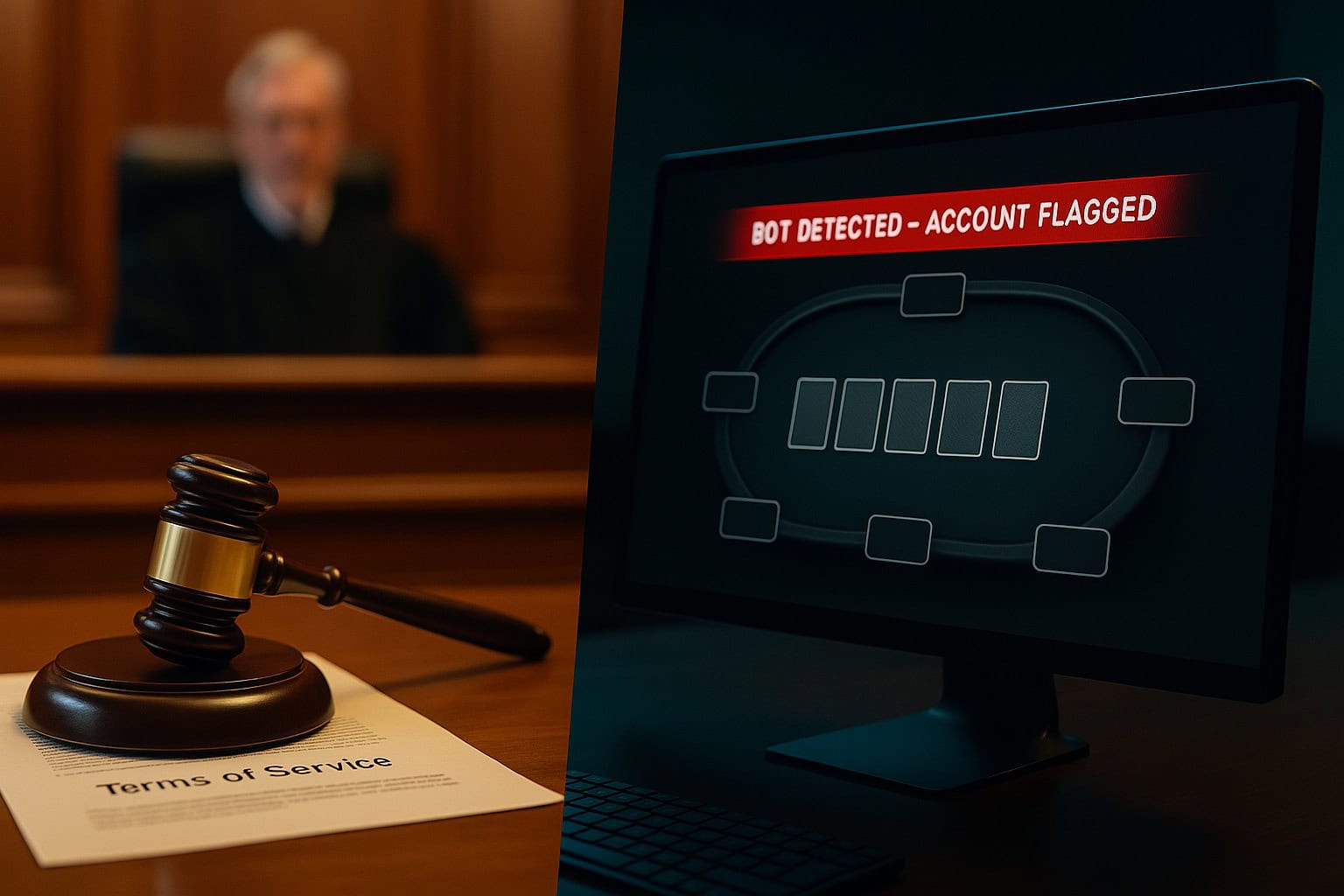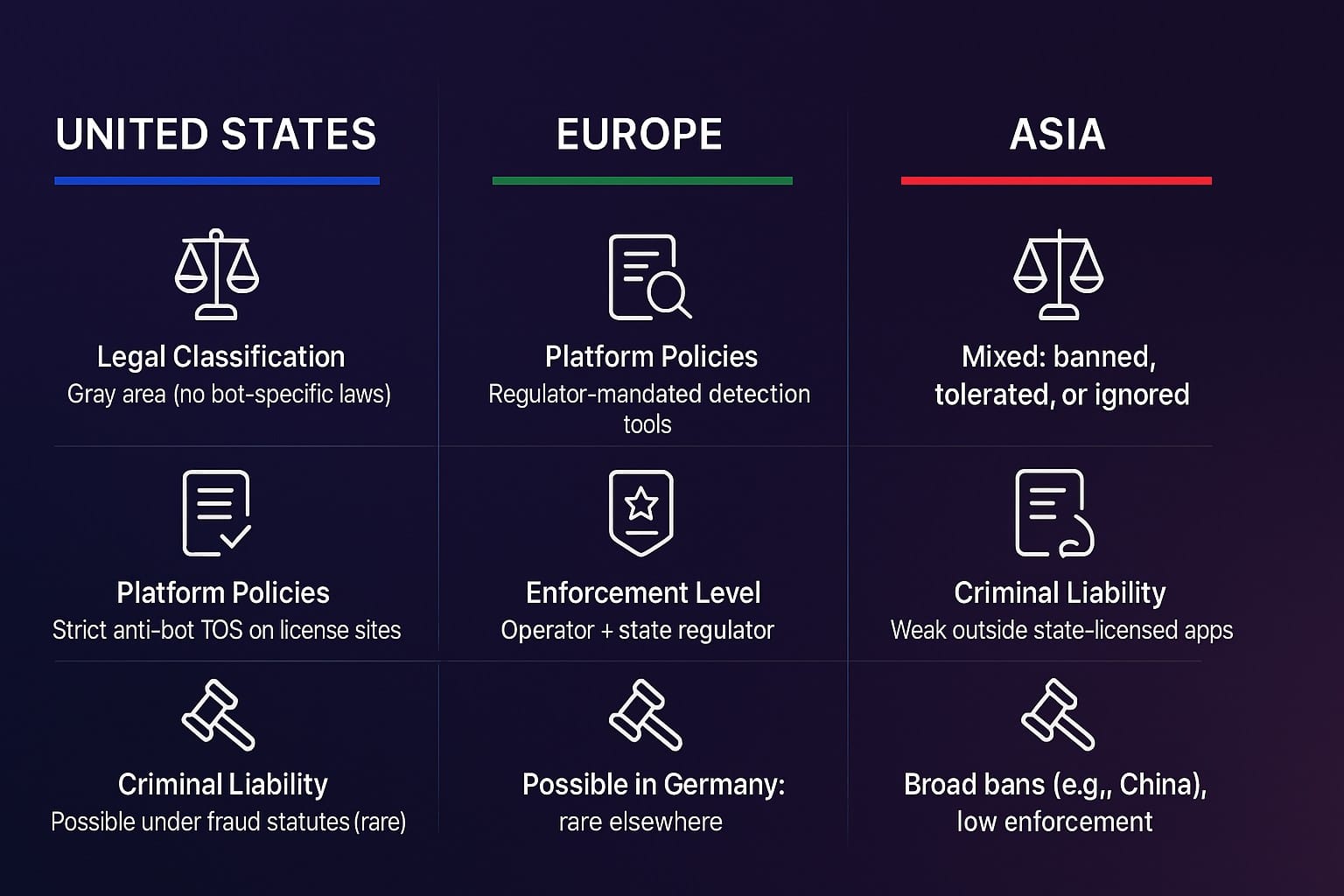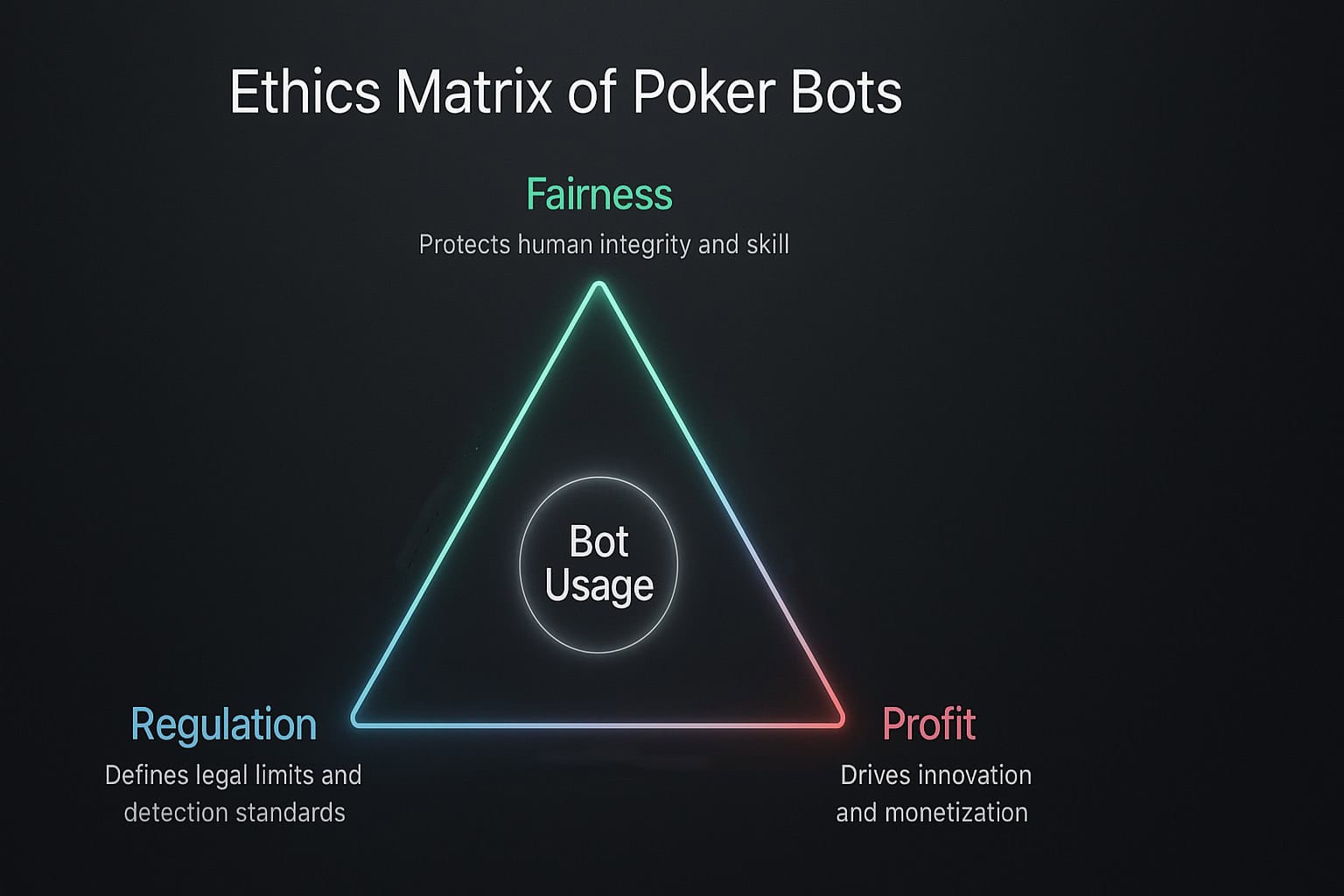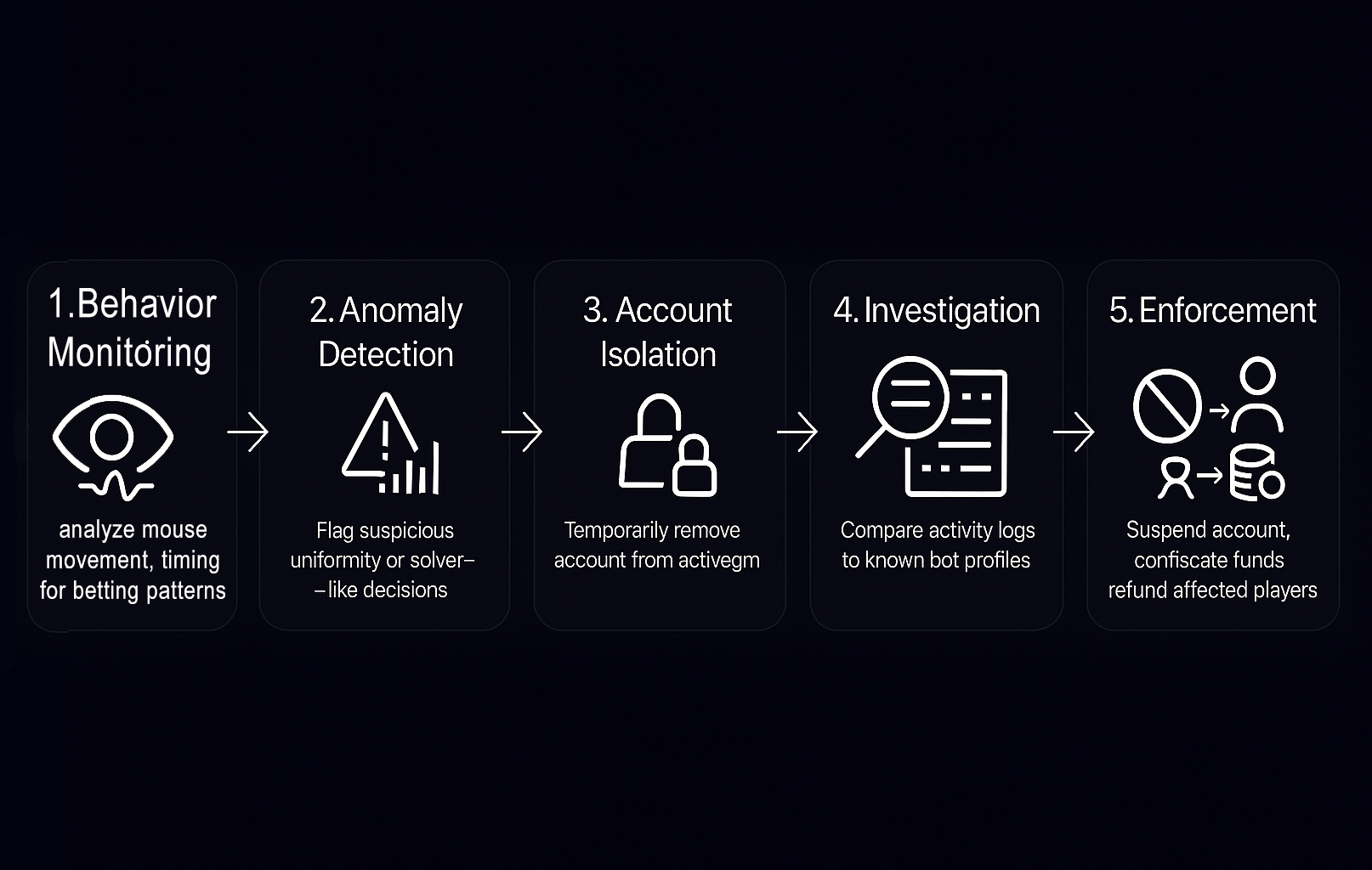
Are AI Poker Bots Legal? A Global Look at AI, Ethics, and the Law
When the Opponent Never Sleeps: The Legal Status of Poker Bots, Explained
You sit down for an online poker session. You win a few hands, then notice something strange. One opponent never types, never pauses, never misclicks. Their timing is suspiciously perfect. You’re not playing against a person – you’re playing against code.
Welcome to 2025, where poker bots have evolved into digital predators — but are poker bots legal? The law is still struggling to catch up.
Whether you’re a grinder, developer, or regulator, one question now matters more than ever:
Are poker bots legal?
The short answer? It’s complicated.
Let’s unpack the global legal landscape, country by country, platform by platform, and see where bots stand – and why it matters for the future of online poker.
Are Poker Bots Legal in the U.S.? Gaps and Gray Zones
At the federal level, poker bot regulation in the U.S. is… murky. The Unlawful Internet Gambling Enforcement Act (UIGEA) doesn’t mention bots directly. It focuses on restricting payments for illegal online gambling – but leaves bot use to interpretationLegal Status of Poker B….
However, bots could fall under broader definitions of fraud or unauthorized software – especially if they violate a site’s terms of service. But no high-profile federal cases have yet targeted bot developers or users specifically for AI-assisted poker.
On the state level, it’s a different story:
- Nevada treats bot use in gambling as a felony.
- New Jersey and Pennsylvania mandate strict anti-bot compliance for licensed platforms.
- In unregulated states like Texas or Florida, there’s little recourse unless the operator itself acts.
The real legal power lies in platform terms of service, which almost universally prohibit bots. That means using one can get your account suspended, your funds confiscated, and possibly open you up to breach-of-contract claims.
Are Poker Bots Legal in Europe? From Soft Bans to Hard Law
In the United Kingdom, poker bots aren’t explicitly illegal – but the UK Gambling Commission requires licensees to prevent “fraudulent or dishonest practices.” Courts have interpreted this to include automated play. In 2023, a UK operator suspended 1,200 accounts tied to bots under that very clause.
Meanwhile, Germany takes the hardline approach. Article 4(7) of its Interstate Gambling Treaty explicitly bans poker bots as automated decision systems. Violation can result in fines of up to €500,000 and license loss.
Other EU countries fall somewhere in between, with fragmented enforcement. Still, the push for centralized AI regulation – like the EU AI Act – could classify bots as high-risk systems, forcing transparency and accountability on developers.
Poker Bots Legal Status in Asia: A Legal Labyrinth
The Asian legal landscape ranges from prohibition to silence.
- In China, poker itself is banned, and so are all online gambling applications. Bot legality is irrelevant – it’s all illega.
- In India, regulated platforms like PokerBaazi strictly forbid bots, citing cheating under state laws. But enforcement is often limited to suspending accounts.
- In offshore hubs like the Philippines or Cambodia, regulators take a more “hands-off” approach, letting platforms self-police – if at all.
Bots thrive where regulation is weak. And Asia’s unregulated poker markets are a bot haven.
Are Poker Bots Legal Offshore? Loopholes and Lookaways
If you’re wondering where most poker bots operate – it’s probably Curacao, Kahnawake, or other offshore gambling zones.
These jurisdictions offer cheap licenses, minimal enforcement, and little incentive to block bots. As long as the rake keeps flowing, everyone looks the other way.
But global pressure is mounting. The Financial Action Task Force (FATF) and International Association of Gaming Regulators (IAGR) are pushing for stricter anti-bot standards. Some platforms are voluntarily adapting – others, not so much.

Terms of service: The law that actually works
Let’s be real: platform TOS are the most effective legal weapon against poker bots.
Here’s what they say:
- PokerStars: Bots = fraudulent activity. You’re out.
- GGPoker: Any unauthorized software = instant ban.
- PartyPoker: Monthly bot detection reports and enforcement updates.
Break the rules? They’ll confiscate your winnings and close your account.
It’s civil enforcement, not criminal – but it works.
And sometimes, platforms go further: In 2023, 888poker refunded $362,000 to players harmed by bots. In 2021, PokerStars redistributed $1.5 million after a major bot ring was uncovered.
So what happens if you get caught?
If you’re using a bot, expect:
- Account ban
- Winnings seized
- Potential blacklisting across multiple sites
- Zero chance of appeal (if you’re on an unregulated site)
But criminal prosecution? Rare. Most bot enforcement is civil or contractual, not criminal. Unless you’re operating a bot farm at scale, the law won’t come knocking.
Yet.
But are bots inherently illegal?
That’s where it gets interesting.
Most laws don’t ban the software itself. You can legally build, sell, or distribute poker bots – as long as you don’t market them for use on platforms that prohibit them. The line is drawn not at the tool, but how and where it’s used.
That’s why some bot developers openly sell products for “research purposes,” knowing full well they’ll be used to beat micro-stakes online.
Legal? Technically, yes. Ethical? That’s another story.
Ethics: When advantage becomes exploitation

Here’s the ethical dilemma: Poker bots violate the spirit of the game.
Poker is built on incomplete information, intuition, deception, emotion. Bots strip all that away.
- They don’t tilt.
- They don’t sleep.
- They don’t misclick.
- They don’t care if you had a bad day.
In games where bots are present, human win rates drop by up to 62%Legal Status of Poker B…. Recreational players – the economic engine of poker – get wiped out and don’t come back.
It’s not just cheating. It’s market erosion.
Detection: The never-ending arms race
Sites are getting smarter.
- Behavioral analysis: Looking for robotic timing and decision consistency.
- Mouse movement entropy: Humans move erratically. Bots don’t.
- Pattern recognition: Identifying solver-like play over big hand samples.
But bots are also getting smarter.
They now randomize actions, mimic human misclicks, and even simulate chat interaction. Some use neural networks to learn how to appear humanLegal Status of Poker B…Legal Status of Poker B….
It’s a full-on arms race – with your bankroll caught in the middle.

What the future holds: regulation, registration, and reform
Global regulators are waking up. Here’s what’s coming:
- Mandatory bot transparency: Labeled AI tables only.
- Third-party audits: To detect bots across operators.
- Bot registration: Developers must disclose capabilities.
- AI risk classification: Bots treated like other high-risk AI tools.
The endgame? A split ecosystem:
- Human-only tables, strictly monitored.
- AI-allowed tables, with explicit participation.
- Hybrid training environments, where bots assist but don’t replace.
Fair? Maybe. Sustainable? Definitely more than the current mess.
Final thought: You can’t outlaw progress – but you can regulate impact
Poker bots aren’t going anywhere. But the question ‘Are poker bots legal?’ will keep shaping the game. They’re evolving, they’re learning, and they’re beating humans in ways we didn’t expect.
The law isn’t designed to stop technology. But it can create systems where innovation coexists with integrity.
That means:
- Stronger detection tools
- Transparent platform policies
- Legal clarity across borders
- And most importantly – ethical standards that keep the game human
Because poker isn’t just math.
It’s people, risk, emotion, and reading the room.
And when bots take over that room – we all lose.
